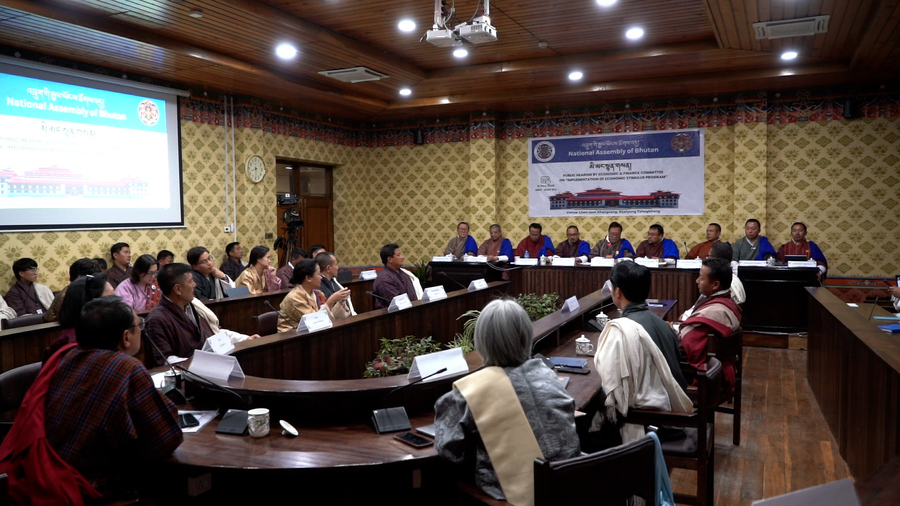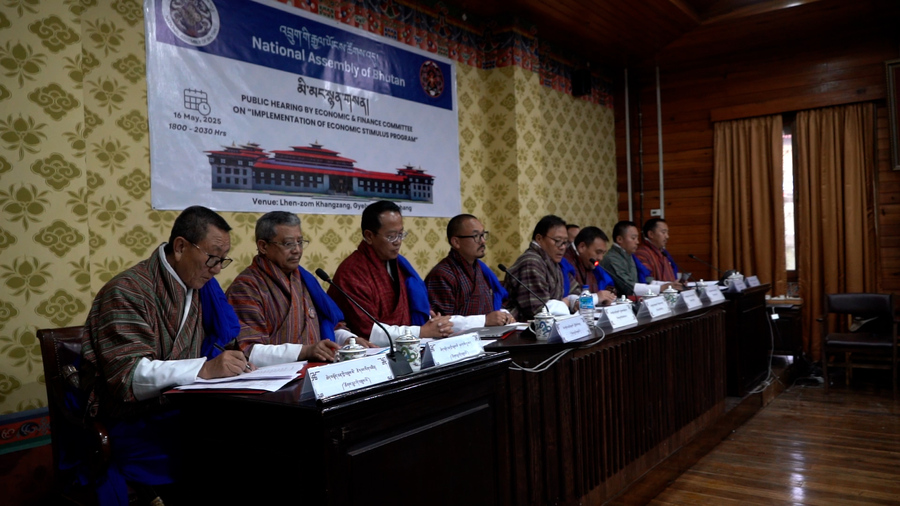 Delays in fund disbursement, poor public awareness, key sectoral exclusions, and limited loan access dominated the National Assembly’s public hearing on the Nu 15bn Economic Stimulus Programme, ESP held on Friday. The public hearing, conducted by the Economic and Finance Committee of the National Assembly, raised critical questions about the programme’s overall effectiveness and fairness in reaching its intended beneficiaries on the ground.
Delays in fund disbursement, poor public awareness, key sectoral exclusions, and limited loan access dominated the National Assembly’s public hearing on the Nu 15bn Economic Stimulus Programme, ESP held on Friday. The public hearing, conducted by the Economic and Finance Committee of the National Assembly, raised critical questions about the programme’s overall effectiveness and fairness in reaching its intended beneficiaries on the ground.
The Nu 15bn ESP, designed to provide both short-term loans and long-term support to businesses affected by COVID-19, has allocated over five billion ngultrum for concessional loans and interest subsidies, while nearly 10bn has been set aside for longer-term initiatives such as tourism promotion and artisan support.
However, Member of Parliament of Monggar constituency in Monggar questioned the long-term funds, highlighting overlaps with the 13th Five-Year Plan’s economic programmes.
“People are asking why Nu 9.7bn has been set aside in addition to the 80bn already allocated for economic programmes under the 13th Plan. They feel that if this amount were provided directly as loans, it would benefit a wider section of the population. So the question being raised is: are there any chances this could happen?” said Naiten Wangchuk, a member of the Economic and Finance Committee, NA.
In response, Director Chencho of the Prime Minister’s Office clarified that the Nu 9.7bn under the Economic Stimulus Programme (ESP) is intended for long-term programmes aimed at creating an enabling environment for economic recovery. He emphasised that the goal is to build the right ecosystem for loan recipients and businesses to thrive rather than simply disbursing the funds as direct loans.
Limited sectoral inclusion also emerged as a critical issue. While ESP focuses on agriculture, production, and manufacturing, several stakeholders, including the Bhutan Chamber of Commerce and Industry, called for broader coverage, highlighting that the pandemic has affected a wider range of industries, especially for trading sector. The Ministry of Finance defended the sector priorities, emphasising the importance of job creation and production.
Finance Secretary Leki Wangmo said, “The ESP is a stimulus plan, not a bailout package. While the trading sector is important, it was not included because it offers low value addition to domestic productivity. Furthermore, employment generation in the trading sector is relatively limited compared to sectors like agriculture, production, and manufacturing.”
 Public awareness and financial literacy gaps were repeatedly cited as barriers to effective uptake and repayment of ESP loans. Radhi-Sakteng MP, Tashi Tenzin, emphasised that despite the government’s efforts to conduct online awareness campaigns and train gewog officials, nearly 26,000 farmers reportedly struggle with loan repayments.
Public awareness and financial literacy gaps were repeatedly cited as barriers to effective uptake and repayment of ESP loans. Radhi-Sakteng MP, Tashi Tenzin, emphasised that despite the government’s efforts to conduct online awareness campaigns and train gewog officials, nearly 26,000 farmers reportedly struggle with loan repayments.
To this, Governor Dasho Penjore assured that the central bank is in talks with financial institutions to ensure they understand the real challenges faced by business entities in the post-pandemic context.
The Governor said, “We have been providing financial literacy across the country, but just having knowledge isn’t enough. We need to work together by not only educating people, but also by ensuring their ideas are supported by banks and backed by the government.”
On the possibility of a second round of ESP lending, the ESP Steering Committee said another round could be considered once current loans are recovered.
The Economic and Finance Committee (EFC) will compile a detailed report outlining its findings and recommendations, which will be presented during the upcoming Parliament session.
The Economic Stimulus Programme is part of the government’s election campaign pledges to revive the country’s COVID-19 pandemic-affected economy.
Tashi Dekar
Edited by Phub Gyem








